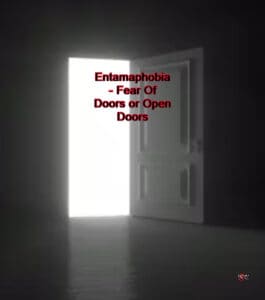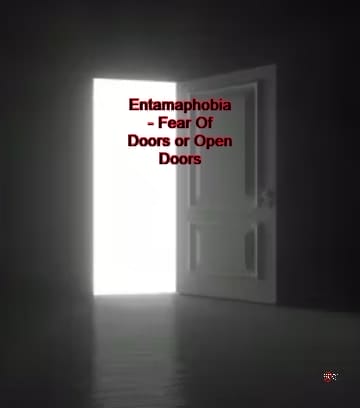Share This Article
Close the Door on Entamaphobia
Have you ever felt terrified at the sight of open doors? Does the thought of an open door trigger you and send you into panic mode? You’re not alone.
If you’re dealing with this fear, you may be wrestling with many questions such as: What is the fear of open doors called? Or, is it a legitimate phobia?
In answer to these questions, the phobia of open doors is known as entamaphobia. And while it may sound unusual, it is a legitimate fear. As a matter of fact, it’s a fear that could severely impact your functioning and overall quality of life.
However, there are ways in which you can manage your triggers better, deal with the fear, and gradually overcome it. Read on to learn more about entamaphobia, what causes it, and how you can overcome this fear so it doesn’t control your life!
What Is Entamaphobia All About?
Entamaphobia is essentially the fear of doors. It is derived from the Greek words eisodos portos, which roughly translates to “entrance” or “entryway,” and phobos, which translates to “phobia.”
It is typically associated with claustrophobia, which is the fear of closed, cramped spaces that causes individuals to be fearful of closed doors. And it’s also closely connected with agoraphobia, which causes an individual to be afraid of going outdoors or of being in public spaces among strangers.
In entamaphobia, an open door may trigger a seemingly irrational or disproportionate sense of anxiety, fear, or panic. Typically, this phobia is associated with doors in general, regardless of whether they’re open or closed, but open doors may be particularly triggering.
Though this phobia may not rank at the top of the list of phobias, it is not uncommon either. In fact, actor Matthew McConaughey also experiences entamaphobia.

Entamaphobia Causes
If you suffer from entamaphobia, you may often wonder, “Why do open doors give me anxiety?”
Like most phobias and anxieties, entamaphobia is often rooted in one’s childhood. If you experience this phobia, it may be because you went through a scarring or traumatic incident in your childhood involving open doors that has left a lasting impact in your mind.
For example, as a child you may have been in bed trying to fall asleep, but your bedroom door was left ajar. This might have caused it to open slightly in the breeze, and the sound or movement may have startled or frightened you. Or, perhaps you watched a horror or thriller film that involved creaking doors.
These experiences could have left an impression that has persisted into adulthood. It may cause you to experience severe fear when a door is left open. It may also leave you feeling vulnerable if you think that any threat may be able to barge in and gain access to you through an open door.
If you’ve grown up in a toxic or abusive household, even that may cause you to be afraid or uncomfortable with open or unlocked doors.
In many cases, this fear of open doors gradually develops over time. Perhaps you’re a nervous individual prone to feeling afraid, stressed, or panicked. This anxiety can worsen over time and result in an actual phobia. Sometimes, a stressful period in your life can also cause you to develop intrusive thoughts regarding open doors, which translate into entamaphobia.
What Are the Symptoms of Entamaphobia?
It is always good to be able to recognize the symptoms of a phobia so you can be better prepared to deal with it. Entamaphobia symptoms can manifest physically, mentally, and emotionally.
Physical Symptoms
- Shivering
- Hot flashes
- Cold sweats
- Palpitations
- Sweating
- Trembling or shaking
- Breathlessness
Mental/Emotional Symptoms
- Dread
- Anxiety
- Panicking
- Feeling helpless
- Extreme discomfort
- Nightmares or insomnia
- Hypervigilance
- Intrusive thoughts relating to open doors
Self-Help for Coping with Entamaphobia
Learning to cope with entamaphobia may reduce its severity and symptoms. It’s also helpful to know what to do if you experience a panic attack when your entamaphobia is triggered.
Some ways in which you can regulate your nervous system and cope with an entamaphobia trigger include:
- Deep breathing exercises
- Yoga or other physical exercises that help you feel grounded
- Self-affirmations that remind you that you are safe and secure
- Journaling to release pent-up anxiety
- Educating yourself on the nuances of entamaphobia, so you feel more informed and in control
- Mindfulness meditation
If your entamaphobia is not too severe, you may be able to address it with self-help strategies alone.
Professional Help
In instances where your entamaphobia becomes debilitating and you find yourself struggling to function normally, seek professional help.
For entamaphobia treatment, a therapist will typically help you address your phobia in the following ways:
- Cognitive behavioral therapy (CBT) challenges and alters your negative thought patterns and beliefs associated with open doors.
- Exposure therapy will gradually increase your exposure to triggers. Over time you become immune to them and are no longer overwhelmed by fear and anxiety.
Experienced professionals can help you cope with entamaphobia in a controlled, safe space to ensure the treatment is effective.
How to Avoid Entamaphobia?
It may be impossible to control what phobias you develop in your life, but you can control how you approach and respond to triggers.
If you wish to avoid experiencing enatamaphobia’s symptoms, you can take measures such as adding locks to the doors in your house so they click when they are shut. This will help you know for a fact that a particular door is securely closed, and you won’t feel unsafe at the thought of a door being left open.
You can also ask your friends, family, and coworkers to accommodate your fear and triggers concerning open doors. Ask that they close your room or office door if they happen to open it at any point.
Simple measures like these can significantly help you avoid the symptoms of entamaphobia.
Conclusion
Phobias can be debilitating if they aren’t understood, acknowledged, and dealt with properly. They can also leave you feeling alone and misunderstood, especially if you find others don’t relate to your feelings.
Allow yourself the space to acknowledge your phobia and take steps to address it. Remember, you’re not being unreasonable or a burden. What you are experiencing is valid. And with a little work and care you can face your fears head-on and overcome your phobias. Soon, you may even be opening the door to possibility!



